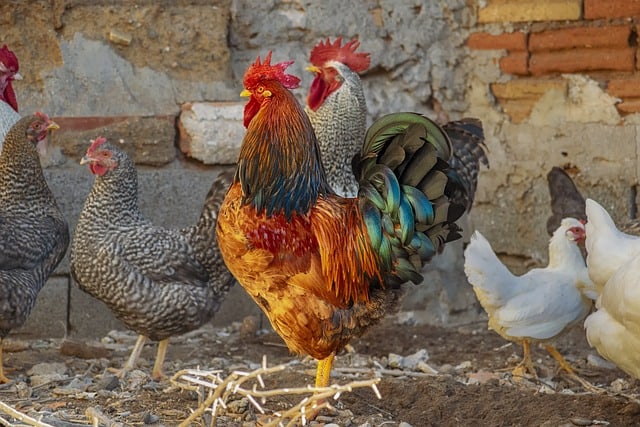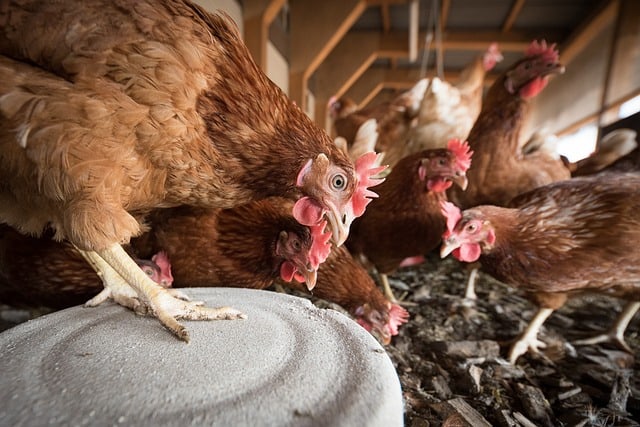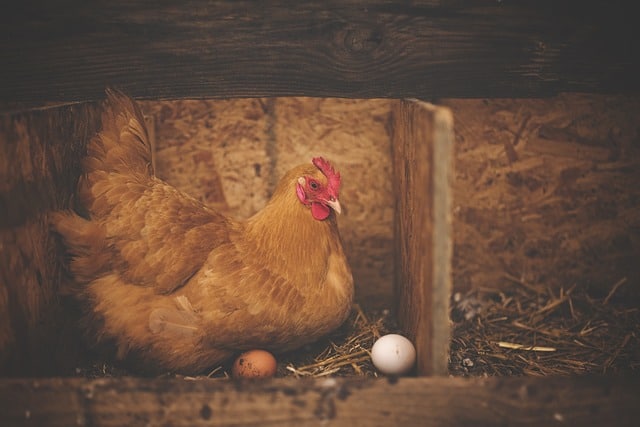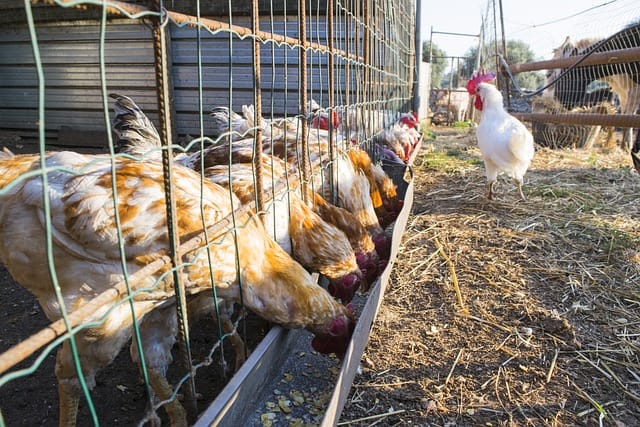Optimal productivity is the dream of every backyard farmer. It means more food for your family and higher profits.
So, they would be happy to have a breed of chicken that can lay as many eggs as possible. But can chickens lay two eggs a day?
We’ll try to answer this question in the best way possible for you to understand. Our answer is based on solid science and in-depth research.
We’ll describe the most important factors that influence egg production frequency in chickens, examples of breeds that are popular for laying more eggs, and a few tips on how to improve egg production in your flock.
The chicken egg-laying cycle is a natural process by which hens lay eggs. The laying cycle is influenced by various factors such as breed, age, nutrition, environment, and lighting conditions.
Typically, a hen will start laying eggs at around 5 to 6 months of age and continue to lay eggs for 1 to 2 years. During this period, the hen lays an egg every 24 to 36 hours, and the egg production rate is influenced by the amount of daylight the hen receives.
Hens need at least 12 hours of light per day to maintain their egg production rate.
- Growth phase: During this phase, the hen’s body is developing, and she is not yet ready to lay eggs. This phase lasts from hatch to around 20 weeks of age.
- Peak phase: This is the period when the hen’s egg production is at its highest. The peak phase lasts from around 21 weeks to 32 weeks of age.
- Decline phase: After the peak phase, the hen’s egg production rate gradually declines. The decline phase typically starts around 33 weeks of age and continues until the end of the laying cycle.
It’s important to note that a hen’s egg production rate can also be influenced by factors such as stress, disease, and environmental conditions.
For example, if your hen is stressed or sick, her egg production rate may decrease or stop altogether.
Similarly, if you’re not feeding her well or exposing her to extreme temperatures, her egg production rate may be affected.
Understanding the chicken egg laying cycle can help you optimize your production and ensure the welfare of your hens.
By providing the right nutrition, lighting conditions, and environment, backyard farmers can help their hens maintain a healthy egg production rate and ensure a steady supply of fresh eggs.
Contents
Factors That Affect a Chicken’s Egg Laying Frequency
There are several factors that can affect your chicken’s egg-laying frequency, including:
- Age: Young chickens typically start laying eggs around 5-6 months of age and their egg production peaks around 1-2 years of age. After that, their egg production gradually declines.
- Breed: Different chicken breeds have different egg-laying capabilities. Some breeds, such as Leghorns, are known for their high egg-laying frequency, while others, such as Silkies, lay fewer eggs.
- Nutrition: A balanced diet that provides all the necessary nutrients, including protein, calcium, and vitamins, is important for maintaining a chicken’s health and egg-laying frequency.
- Light: Chickens need exposure to light to stimulate egg production. During the fall and winter months, when the days are shorter, chickens may lay fewer eggs or stop laying altogether.
- Stress: Stressful conditions, such as overcrowding, loud noises, and predators, can cause a decrease in egg production.
- Disease: Certain diseases, such as infectious bronchitis or avian influenza, can cause a decrease in egg production or even stop it altogether.
- Molt: Chickens go through a molting period once or twice a year, during which they lose and regrow their feathers. During this time, they may stop laying eggs or lay fewer eggs.
- Genetics: The genetics of the chicken can also play a role in its egg-laying frequency. Some breeds have been selectively bred for high egg-laying capabilities, while others may not lay as many eggs.
Can Chickens Lay 2 Eggs a Day?
Chickens typically lay one egg per day. It is very uncommon for a chicken to lay two eggs in a single day, although it is not impossible.
There are certain factors that can affect the number of eggs your chicken lays, such as breed, age, nutrition, and daylight hours. For example, younger hens tend to lay more eggs than older hens, and certain breeds are known to lay more eggs than others.
If your chicken does lay two eggs in a day, it is often because she has held onto an egg from the previous day and then laid another one the following day. This is known as a “double yolk” egg and is not a common occurrence.
It’s also worth noting that if a chicken is laying two eggs per day consistently, it could be a sign of a health issue or other problem, and it’s important to consult with a veterinarian to ensure the chicken’s well-being.
The Best Chicken Breeds for High Egg Production

There are many chicken breeds that are known for their high egg production. Here are some of the best chicken breeds for high egg production:
- Leghorn: Leghorns are known for their exceptional egg-laying abilities. They are very active and hardy birds, and they can lay up to 300 white eggs per year
- Rhode Island Red: Rhode Island Reds are also excellent layers, producing up to 250 brown eggs per year. They are hardy birds and are known for their calm and friendly disposition.
- Plymouth Rock: Plymouth Rocks are dual-purpose birds that are known for their meat as well as their egg production. They are hardy birds that can lay up to 280 brown eggs per year.
- Sussex: Sussex chickens are known for their friendly and docile temperament. They can lay up to 250 brown eggs per year.
- Australorp: Australorps is another dual-purpose bird that is known for its excellent egg-laying abilities. They are hardy birds that can lay up to 250 brown eggs per year.
- Orpington: Orpingtons are friendly and docile birds that are good for backyard flocks. They can lay up to 200 brown eggs per year.
- Marans: Marans are known for their dark brown eggs. They are hardy birds that can lay up to 200 eggs per year.
When choosing a breed for egg production, it is important to consider your climate, your space limitations, and your personal preferences. Each breed has its own unique characteristics, so it’s important to do your research before making a decision.
Tips for Boosting Egg Production in Chickens
There are several factors that can influence egg production in chickens. Here are some tips to help boost egg production:
- Provide a balanced diet: Chickens need a diet that is high in protein, calcium, and other essential nutrients. Feed your chickens a balanced diet that meets their nutritional needs.
- Ensure adequate water supply: Chickens need access to clean water at all times. Dehydration can reduce egg production.
- Maintain proper lighting: Chickens need at least 14 hours of light per day to stimulate egg production. Consider installing artificial lighting in the coop during the winter months
- Keep the coop clean: A clean coop reduces the risk of disease and stress, which can negatively impact egg production.
- Provide enough nesting boxes: Chickens need a private and comfortable place to lay their eggs. Provide one nesting box per three to four chickens.
- Allow for outdoor access: Chickens that have access to a yard or outdoor space tend to lay more eggs than those that are confined to a coop.
- Monitor for parasites and diseases: Parasites and diseases can cause stress and decrease egg production. Regularly check your chickens for signs of illness and take appropriate measures if necessary.
By following these tips, you can help ensure that your chickens stay healthy and productive.
Also read: Best Automatic Chicken Waterer Reviews
The Importance of Proper Nutrition for Egg-Laying Hens
Proper nutrition is critical for egg-laying hens, as it directly affects their health, productivity, and egg quality. Hens that are not fed a balanced and nutritious diet may experience a range of health problems that can lead to reduced egg production, poor egg quality, and even death.
Some of the key nutrients that egg-laying hens require include protein, energy, vitamins, and minerals. These nutrients are essential for the development and maintenance of the hen’s body, as well as for the production of high-quality eggs.
Protein is particularly important for egg-laying hens, as it is necessary for the development of egg white, which is primarily composed of protein. Hens require a consistent supply of high-quality protein to ensure that they can produce a sufficient number of eggs and that those eggs are of good quality.
Energy is also critical for egg-laying hens, as it provides the fuel that the hen’s body needs to carry out its various functions, including egg production. Hens that are not fed enough energy may produce fewer eggs or stop laying altogether.
Vitamins and minerals are also important for egg-laying hens, as they play a crucial role in maintaining the health and well-being of the bird. For example, calcium is essential for the formation of strong eggshells, while vitamin D is needed to help the hen absorb and use calcium effectively.
Overall, providing egg-laying hens with a balanced and nutritious diet is essential for ensuring their health, productivity, and the quality of the eggs they produce. Farmers and producers should work with animal nutritionists to develop feeding programs that meet the specific nutritional needs of their hens, taking into account factors such as age, breed, and level of egg production.
Also read: A Guide On What To Feed Your Baby Chicks
Common Egg-Laying Problems and How to Solve Them

There are several common egg-laying problems that backyard chicken owners may encounter. Here are some of them and how to solve them:
- Soft-Shelled Eggs: Soft-shelled eggs may be caused by a lack of calcium in the diet or by stress. To prevent this problem, make sure your chickens have access to a calcium supplement, such as crushed oyster shells or calcium-fortified feed. Also, try to reduce stress in the coop by keeping the area clean, providing enough space, and minimizing loud noises.
- Thin-Shelled Eggs: Thin-shelled eggs are often caused by the same factors as soft-shelled eggs, including a lack of calcium and stress. To prevent this problem, follow the same steps as for soft-shelled eggs.
- No Eggs: If your chickens are not laying any eggs, it may be due to several factors, including age, health issues, or stress. Make sure your chickens are getting enough food and water, and provide them with a comfortable and stress-free living environment. Also, make sure they are receiving adequate sunlight and that they are not too old to lay eggs.
- Fewer Eggs: If your chickens are laying fewer eggs than usual, it may be due to the same factors as no eggs. Try to identify the cause and address it accordingly. It could also be due to seasonal changes or molting, in which case you should wait until your chickens start laying again.
- Abnormal Eggs: Abnormal eggs can include eggs with no shells, double-yolked eggs, or eggs with blood spots. These can be caused by a variety of factors, including stress, age, and disease. To prevent this problem, ensure your chickens have a comfortable and clean living environment, are not too old, and are receiving enough nutrients in their diet.
In summary, egg-laying problems in chickens can often be prevented or solved by providing a healthy and stress-free environment, ensuring adequate nutrition, and addressing any health issues.
Raising Chickens for Eggs: FAQs
1. What are the basic requirements for raising chickens for eggs?
To raise chickens for eggs, you will need a coop or a chicken house, a safe and secure outdoor run, feed and water containers, bedding material, and of course, chickens. It’s important to keep the coop clean and well-ventilated, provide access to clean water at all times, and offer high-quality feed and supplements to keep the chickens healthy.
2. How many chickens do I need to get a good supply of eggs?
It depends on your needs and preferences. A single hen can lay about five to six eggs per week, so if you want a dozen eggs per week, you would need two to three hens. However, it’s important to note that egg production can vary depending on factors such as the breed of chicken, the age of the hen, and the season.
3. What breed of chickens is best for egg production?
There are many breeds of chickens that are known for their egg-laying abilities. Some popular breeds include Rhode Island Reds, Leghorns, Sussex, Plymouth Rocks, and Orpingtons. When choosing a breed, consider factors such as egg production, temperament, and size.
4. What should I feed my chickens for maximum egg production?
A balanced diet is essential for optimal egg production. Chickens require high-quality feed that is rich in protein and other essential nutrients. You can purchase commercial chicken feed or make your own using a combination of grains, seeds, and protein sources. Supplementing their diet with fresh fruits and vegetables can also be beneficial.
5. How do I know when my chickens are ready to start laying eggs?
Chickens typically start laying eggs between 16 and 24 weeks of age, depending on the breed. You can tell when a chicken is about to lay an egg by observing its behavior. Hens will often become more vocal and active and may spend more time in the nesting box.
6. How often do chickens lay eggs?
Chickens can lay eggs every 24 to 36 hours. However, egg production can be affected by factors such as age, breed, health, and environmental conditions. Some chickens may lay more or less frequently than others, and production may also decline during the winter months.
7. How do I collect and store eggs?
Eggs should be collected daily to prevent them from becoming soiled or cracked. Store eggs in a cool, dry place and avoid washing them unless absolutely necessary. If you do wash them, use warm water and mild soap, and dry them thoroughly before storing them. Eggs can be stored in the refrigerator for up to a month.
8. How do I keep my chickens healthy?
Keeping your chickens healthy is important for both their well-being and egg production. Make sure to provide clean water and high-quality feed, and keep their living area clean and well-ventilated. Regularly check for signs of illness, and consult a veterinarian if you suspect that your chickens may be sick. It’s also important to protect your chickens from predators and to provide them with adequate space to move around and exercise.
Conclusion
In conclusion, it is possible for chickens to lay eggs although the phenomenon is very uncommon. Various factors can affect your chicken’s egg-laying frequency, including age, breed, diet, environment, and health. If you are looking to boost egg production in your flock, ensure your chickens have a balanced diet, optimal living conditions, and enough light and darkness daily.
In addition, consider adding high-egg laying breeds to your flock such as leghorns and Rhode Island Reds. With proper care and attention, your chickens will lay plenty of delicious and nutritious eggs for you and your family to enjoy.




